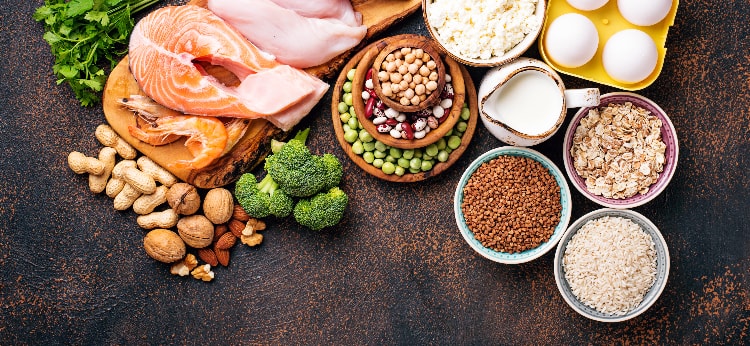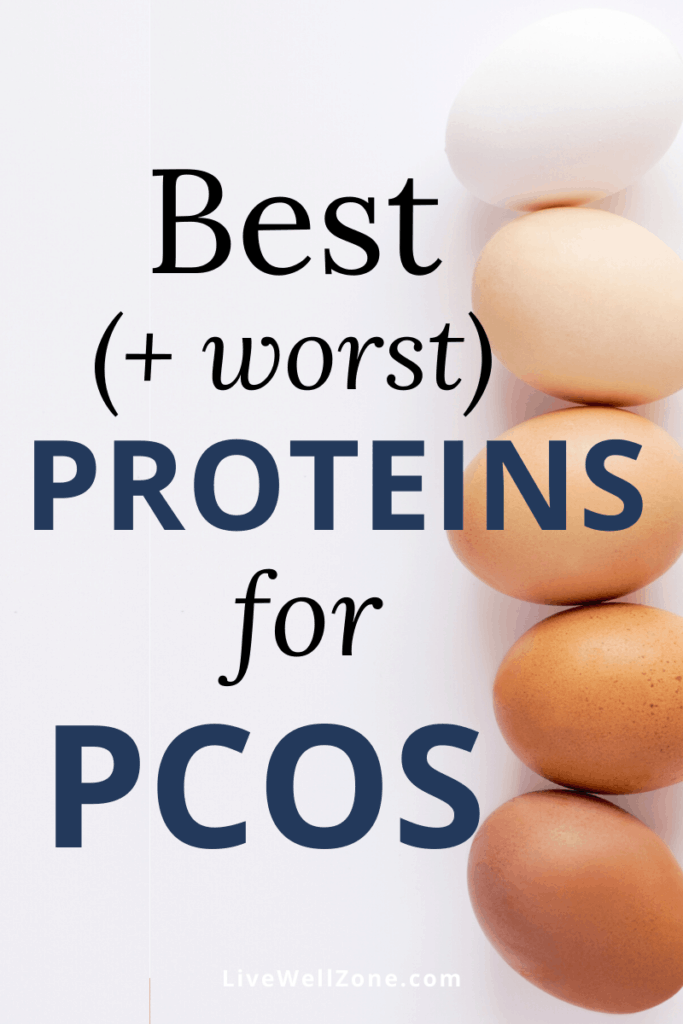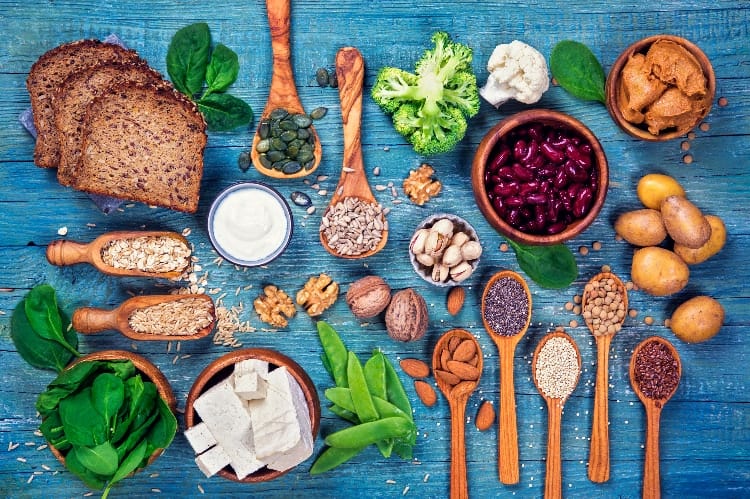
Even though there are lots of different natural remedies for PCOS symptoms, diet is the one thing that usually delivers the strongest, most high impact results.
And there’s research showing that a high protein diet is particularly beneficial for PCOS.
Proteins have the ability to boost metabolism and regulate blood sugar. Given that weight gain and blood sugar imbalances are very common in PCOS, this means that a well balanced, high protein low carb diet can improve polycystic ovary syndrome.
Now, I emphasized “well-balanced” in the previous sentence because too much of a good thing can also be problematic…and it’s no different with protein.
So, if you’d like to learn about high protein foods for PCOS, how much to consume and the best protein sources for your diet, then keep reading!
BENEFITS OF A PROTEIN-RICH DIET FOR PCOS
A 2012 study showed that PCOS patients who ate a high protein diet for 6 months experienced significant improvements in:
- blood sugar levels.
- weight loss.
- reduction of waist circumference.
So, why is it that eating more protein produced helped the women in that study?
Well, here are a few known benefits of a protein-rich diet:
Stabilizes PCOS Blood Sugar
It’s been shown that diabetes patients who eat protein-rich diet experience a (source):
- reduction in post-meal blood sugar levels.
- healthier fasting blood sugar levels .
Both of these benefits are attributed to the fact that protein takes longer to digest.
And this slower digestion means proteins create less of a spike in glucose levels.
Promotes More Fat Burn and Supports PCOS Weight Loss
Every food we eat has a specific thermic effect, i.e. the amount of calories that the body needs to use up in order to digest it.
And that thermic effect is different for fats, carbs and proteins.
When it comes to proteins they have the highest thermic effect. In fact, proteins increase the body’s thermic effect by 15 – 30% (compared to 5 – 10% for carbs and 0 – 3% for fats).
This means that increasing your consumption of protein can trigger your body to burn more calories and increase your metabolism.
Lowers PCOS Cravings
Since proteins are slow to digest, they keep us feeling full for longer periods of time.
As a result, this cuts back on cravings and makes it easier to lose PCOS-related weight gain.
Provides Raw Material for Hormone Production
Proteins are made of compounds known as amino acids.
When we eat protein-containing foods, those proteins are broken down into amino acids and used to make various hormones.
For example, the body uses amino acids to make:
- thyroxine, which is produced by the thyroid and is necessary for various metabolic functions.
- melatonin, which is produced by the pineal gland and regulates our sleep cycle.
- epinephrine and norepinephrine, which are produced in the adrenal medulla (the inner part of the adrenals).
So, by eating sufficient amounts of healthy protein, you are helping your body keep up with it’s hormone-production needs.
HOW MUCH PROTEIN TO EAT FOR PCOS
Even though there’s evidence to back up the benefits of protein-rich foods for PCOS, it’s important to know how much to eat.
In the study that I referenced earlier, a high protein diet is defined as:
- 40% (or more) protein
- 30% fat
- 30% carbs
Do keep in mind that there are serious side effects to consuming too much protein.
These side effects can include nausea, headache, cardiovascular disease, liver injuries and many other symptoms.
In addition, there’s also research showing that a diet that is very high in animal proteins increases the risk of inflammatory conditions and is harmful to the gut (source).
This matters a lot for PCOS because a healthy gut is essential for detoxification and hormone balance.
So, before you load on up proteins, I recommend sticking to the lower end of the spectrum.
This means if you’re going to attempt a high protein diet, approximately 40% of your calories should come from proteins.
As for the remaining 60%, you can do an even split between carbs and fats (30% carbs and 30% fats).
BEST PROTEIN FOODS FOR YOUR PCOS DIET

Now we come to another aspect of eating proteins for pcos…which foods to actually eat.
Your two main choices are:
- animal proteins or
- plant proteins.
Deciding which one to add to your diet is all about understanding the underlying causes of polycystic ovary syndrome.
In this 7-step plan for natural pcos relief, I cover the strong connection between insulin resistance, excess androgens and inflammation.
And in that article I mention the fact that some experts say that PCOS is a low-grade inflammatory condition.
In addition, I also talk about the fact that insulin resistance and excess androgens contribute to inflammation.
Plus….it’s important to know that inflammation also makes insulin resistance and excess androgens worse.
It’s a vicious cycle and the best way to break that cycle is to address inflammation.
Therefore, when choosing proteins for your PCOS diet, go for anti-inflammatory ones.
And that means eating more plant proteins and less animal proteins.
You don’t have to go vegan or vegetarian. You just need to add in more plant proteins.
Doing this can make a big difference in your health because studies have repeatedly shown that a plant-based diet leads to a healthier gut and a much more diverse set of gut bacteria (source).
And if your gut’s happy, then your hormones will be too!
Now when it comes to animal protein, there is one kind that is definitely anti-inflammatory, and that is fatty fish.
Fatty fish has lots of omega-3 fatty acids which are powerful anti-inflammatory fats.
So, as long as you’re getting good quality fish (i.e. not farmed) you can include them in your diet a few times a week.
Here’s a list of healthy proteins to eat for PCOS.
Grains
- amaranth
- quinoa
- teff
- wild rice
- millet
- oats
- buckwheat
- cornmeal (organic)
- spelt
Legumes
- chickpeas
- red beans
- black beans
- navy beans
- pinto beans
- cannellini beans
- lentils
- greens peas
- black eyed peas
- mung beans
- lima beans
- fava beans

Nuts and Seeds
- walnuts
- almonds
- macadamias
- cashews
- peanuts
- pistachios
- brazil nuts
- hazelnuts
- pine nuts
- pecans
- hemp seeds
- sesame seeds
- sunflower seeds
- flax seeds
- chia seeds

Vegetables
- broccoli
- brussel sprouts
- corn (organic)
- asparagus
- potatoes (with the skin)
- beet greens
- mushrooms
- sweet potatoes
- spinach
- collard greens
Fruits
- avocados
- guavas
Animal Proteins
- Organic, hormone-free, antibiotic-free eggs (if they’re also pasture-raised that’s great because pasture-raised eggs have more anti-inflammatory omega-3 fats).
- Wild-caught fatty fish (salmon, mackerel, sardines, anchovies)
Soy Protein for PCOS
For many women, soy is a convenient source of protein.
However, there are also lots of concerns about soy’s phytoestrogens and how that affects hormones.
There are two main things to know when it comes to the majority of the soy on the market:
- soy is one of the most heavily genetically modified foods. And since it’s GMO it’s resistant to pesticides. So it’s actually sprayed with waaaay more pesticides. And pesticides are estrogen-based compounds, so that’s definitely a red flag.
- most of the soy consumed in the West is unfermented. Meanwhile, in Asian countries (where soy is supposed to contribute to their health) they consume mainly fermented soy.
So, if you choose to consume soy, it must be organic and fermented.
Here are some fermented soy products to choose from:
- tempeh
- miso
- natto
- fermented tofu (not very common but it’s definitely a thing!)
Other
- spirulina powder
- nutritional yeast (unfortified is best)
As you can see there’s an abundance of tasty foods that provide protein.
Now, do keep in mind that even though some plant foods have more protein (notably legumes, nuts and seeds) that doesn’t mean you should ignore the plants with lower protein content.
After all, the foods with lower protein content have other beneficial nutrients that your body needs.
So, focus on eating a rainbow of foods.
Not only is this better for your health, but it also means you won’t get bored eating the same 3 things every day 🙂
RELATED QUESTIONS
Which fruits are good for PCOS?
Antioxidant-rich fruits are ideal for PCOS because they help to reduce inflammation.
Some antioxidant-rich fruits to choose from include strawberries, blueberries, blackberries, mangoes, papayas, plums, oranges, grapes and cherries
Does green tea lower androgens?
Yes, scientific literature shows that green tea can be considered an anti-androgen because it contains compounds that inhibit an enzyme called 5-alpha reductase.
This matters a lot for androgen levels because 5-alpha reductase converts testosterone into the more potent androgen, DHT.
CONCLUSION
Whether you choose to go with a high protein low carb diet, or some other variation that works for you, food definitely has tremendous powers that you can take advantage of.
So, don’t hesitate to experiment with the tips in this article.
And if you need more help putting together a diet that works for you, be sure to check out this guide on hormone balancing foods for PCOS.
I hope you enjoyed this article and if you have any questions or comments, feel free to leave your feedback below.
Related Posts:
How to Make a Fertility Smoothie For PCOS: A Simple Guide With Recipes
How to Use Ginger for PCOS: 5 Tips You Probably Don’t Know
A Complete Guide to Using Cinnamon for PCOS: For Acne, Weight Loss, Menstrual Cycle and More!

